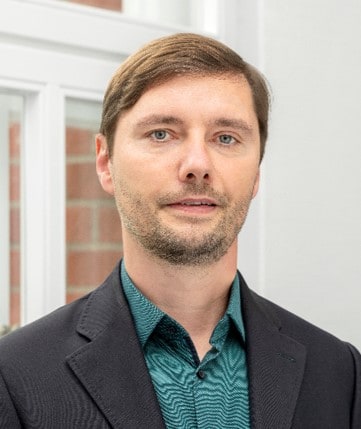
Academic Education
10.1995 – 07.2001 | Study at the Physics Institute of Humboldt-University, Berlin, Germany
14. 04. 1998 | Prediploma in Mathematics at the Humboldt-University, Berlin, Germany
14. 07. 2000 | Master of Philosophy at Loughborough University, UK
27. 07. 2001 | Diploma in Physics at the Humboldt-University, Berlin, Germany
23.09. 2005 | Promotion in Physics (Dr. rer. nat.) at Humboldt-University, Berlin, Germany | Topic: “Many-body effects in the Kondo-lattice model”
Professional Career
11.2003 – 05.2005 | Research Assistant at the Physics Institute of Humboldt-University, Berlin, Germany
05.2005 – 03.2006 | Research Assistant at the Max-Planck-Institut für Eisenforschung GmbH
Since 04.2006 | Head of the group „Computational Phase Studies“ at the Max-Planck-Institut für Eisenforschung GmbH
Since 10.2008 | Head of the Advanced Study Group “Modelling” at the Interdisciplinary Center for Advanced Materials Simulations (ICAMS) at Ruhr-University Bochum
Since 08.2021 | Acting head of the division “Materials Informatics” (FB6.4) of Bundesanstalt für Materialforschung und -prüfung (BAM)
Honours, Awards & Memberships
02.1998 – 03.2001 | Fellow of „Studienstiftung des dt. Volkes“ (Study grant)
04.2001 – 10.2003 | Fellow of „Friedrich-Naumann-Stiftung“ (Promotion grant)
05.2005 – 03.2006 | Research fellow of the Max-Planck society
The Platform MaterialDigital (PMD) and the goal of a Materials Data Space
Suitable material solutions are of key importance in designing and producing components for engineering systems – either for functional or structural applications. Materials data are generated, transferred, and introduced at each step along the complete life cycle of a component. A reliable materials data space is therefore crucial in the digital transformation of an industrial branch.
Therefore, the “Innovation Platform MaterialDigital (PMD) funded by the German Federal Ministry of Education and Research (BMBF), aims to develop a sustainable infrastructure for the standardized digital representation of materials science and materials engineering. With its partners (KIT, Fraunhofer IWM, FIZ, Leibnitz IWT, BAM, MPIE), the PMD is committed to build up a materials science data space. To achieve this the PMD provides a prototypical infrastructure for the digitalization of materials implemented by decentralized data servers, standardized data schemas and digital workflows. Following the FAIR principles, it will promote the semantic interoperability across the frontiers of materials classes.
Standards, methods, and tools developed within the platform are deployed and consolidated within the context of currently near 20 BMBF-funded academic and industrial research consortia and made available to the material science community in general. In this context scientific workflows represent a major focus area, represented within the platform by the workflow frameworks pyiron and SimStack. In consequence, the platform is building up a digital library in form of a workflow store along with common standards for the definition and representation of digital workflows.
In this presentation we will describe the status of our Platform MaterialDigital with a focus on the workflow activities. The current status and the vision for dissemination of the solutions developed in the PMD within the community are provided.